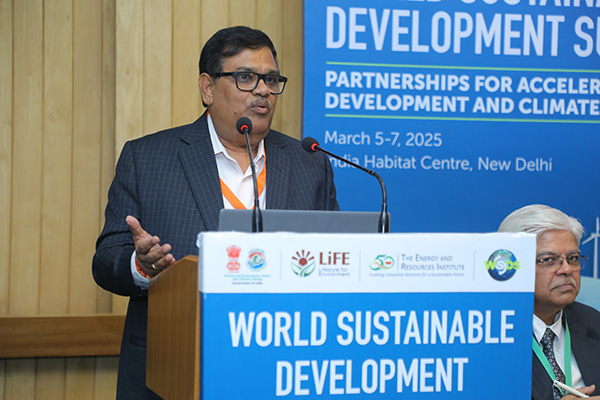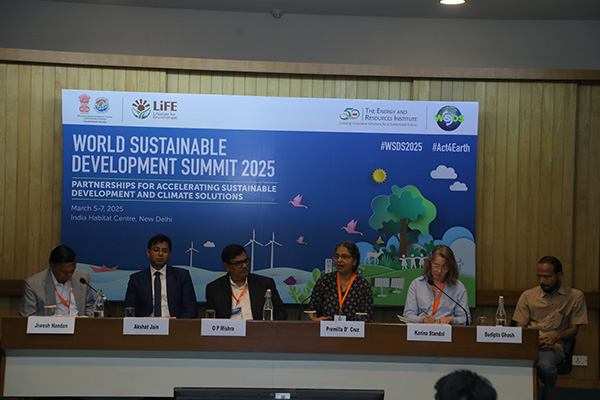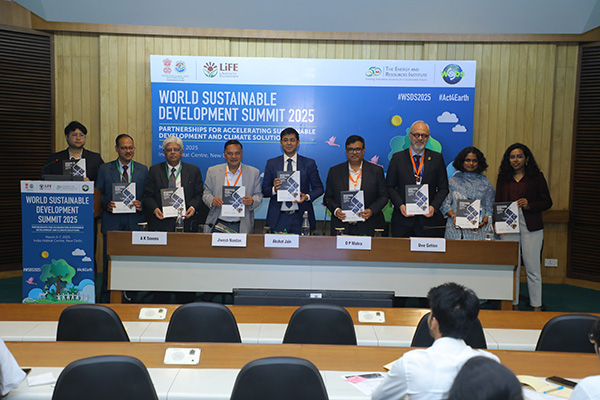Scaling up Building Integrated Photovoltaics (BIPV) Applications in India
New Delhi, March 6, 2025: The thematic track on People-Centric Transition for Energy Equity at the World Sustainable Development Summit (WSDS) 2025 brought together policymakers, industry experts, and grassroots leaders to discuss the socio-economic implications of the coal transition and ensure that affected communities remain central to this shift. The session delved into challenges, global best practices, and actionable solutions for a Just Transition in India’s coal-dependent regions.
Delivering the opening address, Mr A K Saxena, Senior Director, TERI, emphasized the necessity of an inclusive energy transition that prioritizes livelihoods and economic stability. He underscored the need for Just Transition to be more than an energy shift—it must be a socio-economic transformation that secures employment, supports local economies, and ensures no community is left behind.
Dr Jayanta Mitra, Senior Fellow, TERI, presented key insights from TERI’s Just Transition Report, which analyzed the economic and social disruptions caused by coal phase-out in Chhattisgarh, Jharkhand, and Odisha. His presentation provided policy recommendations for mitigating transition risks and ensuring long-term community resilience.
Mr Akshat Jain, IAS, Zila Panchayat Betul, Government of Madhya Pradesh, shared insights into the impact of mine closures in Pathakheda, where economic downturn, depopulation, and an increasing contractual workforce have reshaped the local landscape. He highlighted the urgent need for structured support mechanisms, including reskilling programs, livelihood diversification, and social security measures, to ensure coal-dependent communities can transition successfully.
Providing a global perspective, Mr Uwe Gehlen, Head, Development Cooperation, German Embassy in India, reflected on Germany’s coal phase-out experience and its implications for India. He emphasized that a successful Just Transition requires locally adapted solutions, not direct replication of international models. He noted Germany’s long and complex transition and the importance of Indo-German collaboration, particularly in three Indian coal mines. He also pointed out that as men from coal-dependent regions migrate for work, women are increasingly becoming primary economic drivers.
Mr AK Rastogi, Chairman, Jharkhand’s Task Force on Sustainable Just Transition, underscored Jharkhand’s economic dependence on coal, noting that nearly 50% of the state’s revenue is tied to the fossil fuel sector. He called for state-specific economic diversification strategies and targeted skilling initiatives, particularly for informal workers who have historically relied on the coal economy.
Delivering the keynote address, Mr OP Mishra, Executive Director (Community Development), Coal India Limited (CIL), reaffirmed that while coal remains central to India’s energy mix, a transition strategy must be sustainable and equitable. He highlighted that 70% of India’s electricity and 50% of its total energy needs are still met by coal, making an immediate shift impractical. However, he emphasized the urgent need for policy support, reskilling, and alternative livelihood development to ensure an inclusive transition.
Mr Mishra also led the launch of key initiatives aimed at strengthening India’s Just Transition efforts. He officially unveiled the report "Understanding the Implication of Coal Transition – The Scenario in Chhattisgarh, Jharkhand, and Odisha," which provides a detailed assessment of the economic and social shifts occurring in coal-dependent regions. Additionally, he announced two major projects—"People-Centric Transition in Coal Mining Regions through Holistic Development of Betul, MP," supported by Coal India Limited, and "Mainstreaming Equity and Justice in Land Procurement for Utility-Scale Renewable Energy Projects," supported by Landesa. These initiatives seek to facilitate community-led development, promote alternative livelihoods, and ensure equitable land-use practices.
Following the report and project launches, the session transitioned into a panel discussion moderated by Mr Jiwesh Nandan, Distinguished Fellow, TERI. The panel featured leading experts who provided in-depth insights into strategies for an inclusive and equitable Just Transition.
Prof Premilla D’Cruz, Indian Institute of Management (IIM) Ahmedabad, opened the discussion by addressing social resistance to transition. She emphasized that privileged groups often resist sustainability efforts, thereby slowing down necessary reforms. She called for a shift in consumption patterns and a development paradigm that moves beyond energy-centric metrics.
Dr Karina Standal, Senior Researcher, CICERO (Center for International Climate Research), Norway, stressed the importance of gender-responsive transition strategies, advocating for the active inclusion of women and marginalized communities in decision-making. She highlighted how self-help groups (SHGs) can play a pivotal role in driving local economic transformation, ensuring that economic diversification does not rely solely on green jobs but integrates locally relevant industries such as handicrafts and agriculture.
Mr Nicholas Glicher, Chief Operating Officer, The Global Initiative, provided insights into global best practices, stressing that Just Transition must be fundamentally people-centric, rather than an industrial or economic restructuring effort alone. He cited examples from Scotland, where business-led models have proven effective, and Brazil, where rural-focused transition policies have helped mitigate economic shocks. He urged India to develop region-specific transition models tailored to local socio-economic realities.
Mr Sudipta Ghosh, Deputy General Manager, SELCO India, emphasized the role of decentralized energy solutions in facilitating a Just Transition. He discussed successful applications of District Mineral Foundation (DMF) funds in solarizing Anganwadis, health centers, and micro-food processing units, demonstrating how clean energy solutions can generate new employment opportunities in transitioning economies. He stressed that long-term financial viability and economic feasibility must take precedence over short-term subsidies, advocating for the integration of decentralized clean energy initiatives into India’s broader energy transition strategy.
The discussions underscored the urgent need for reskilling and workforce transition programs that align with emerging industries such as electric vehicles, battery assembly, and solar maintenance. Speakers also stressed the importance of empowering women and SHGs to explore entrepreneurship opportunities in food processing, micro-businesses, and agribusiness. Economic diversification strategies were identified as crucial for reducing dependence on coal, with recommendations to support alternative industries such as localized manufacturing, silk production, and tourism. Additionally, the rehabilitation of coal mine lands for sustainable economic activities, including renewable energy projects, was highlighted as a key opportunity.
The WSDS 2025 thematic track on People-Centric Transition for Energy Equity reinforced that Just Transition is not merely about phasing out coal but about ensuring social justice, economic resilience, and environmental sustainability. The discussions and project launches marked a significant step toward an inclusive and equitable energy transition for India’s coal-dependent regions.




